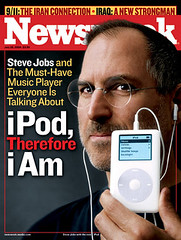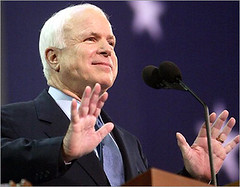
(image via tomgpalmer via newsweek)
In: Steve Jobs. It's a good time to be Steve Jobs.
Steve Jobs is like a rock star to geeks. Apple shares are at a record high. New products were realeased to great fanfare. iPod sales are through the roof. Steve Jobs' nemesis, Michael Eisner, announced he will be doing a show on the cable ghetto CNBC. In an age where Hollywood studio's are good for one thing -- event movies -- Pixar appears to be well-situated. Disney's new CEO, Bob Iger, is bending over backwards to strengthen his relationship with Jobs.
Like The Corsair said: It's a good time to be Steve Jobs.

(image via nyc-architecture)
Out: The Unbearable Whitness of Magazining. The Corsair is a freelance writer now, but that was not always the case. In a previous incarnation -- in our fiesty mid 20s -- we had ambitions at editing one of the New York glossies. Unfortunately, those entry portals never opened, despite our best efforts at getting in the door.
Lizzie Ratner in the salmon-colored weekly does a timely piece on people of color in the magazine industry, or, to be more accurate, the astonishing lack.
Some backstory: The Corsair started as an intern The Nation in 1995. At the time, most of the interns were people of color (2 Asian, 2 African-American, 2 White). There are not enough superlatives to heap on The Nation, which was a wonderful internship. I followed up at New York Magazine, where I factchecked for the remainder of 1995. But afterwards, trying to get an entry position in the magazine industry was -- how does one put it? -- difficult. And one would think that with experience at The Nation and New York, something by the way of an Editorial Assistant position might have been offered. Lord knows I applied to enough venues, especially with the free postage privileges at The Nation.
Interviewing at Conde Nast -- even with Christopher Hitchens as a solid reference -- was a total bust. The interview, which seemed to go ducky, ended, weeks later, with a form-letter rejection. And, afterwards, it seemed like entry into the world of editorships was, quite frankly, impenetrable. Granted, it is a tough nut to crack, this universe of New York glossies; but -- especially in the case of Conde Nast -- we felt the chilly brush off. We eventually landed at Paper Magazine, then the now-defunct Silicon Alley Reporter, then as editor-in-chief at consumer magazine MacDirectory, and, years later, after a stint as Contributing Editor of the dearly departed Razor Magazine, at present, freelancoviching and blogging.
Is it because The Corsair is African-American? Has that played a factor in my lack of editorial connectedness? I'd say no; I am hard-wired to be an optimist, and not to fall back on the race card. That sort of reasoning always struck me as "victimy." Still, this article is intriguing:
"At Cond� Nast, the premier magazine empire, the fleet of 29 top editors includes just one person of color.
�'The magazine industry is probably the least diverse of any of the media. They�ve taken a real pass,' said Pamela Newkirk, a professor at New York University�s Department of Journalism and author of Within the Veil: Black Journalists, White Media. 'As I say that, I can just hear all the people trying to shake the trees to tell you they have all this diversity�and then start mentioning people in the mailroom. But no, I�ve been in too many of these places, and I know firsthand that they are just not diverse.'"
More here. Also: FishbowlNY' s Rachel Sklar, our favorite Canadian, does an excellent follow up here.

(image via parentheticalnote)
In: Governmental Reform. As we said yesterday, the era of legislators taking pride in having their fingerprints all over special interst "Earmarks" is over. Of course, the prescient Senator John McCain has been talking about this since 1999. Today's WSJ notes -- link via wonkette -- that Speaker Hastert, in hopes of defanging Republican corruption as an issue in the 2006 midterm elections, is looking to ban "all privately funded trips for lawmakers."
From a 1999 CNN story, while Senator McCain was campaigning for President:
"Five years after the Republican takeover of Congress, McCain said conservative goals have been held back by special interests who control the legislative process. Special interest earmarks in spending bills have increased under GOP control, he said, adding that as long as soft money donations dominate campaigns, they will dominate legislation.
"'We talk about cutting taxes for working men and women, we talk about providing real school choice for parents, we talk about cutting wasteful spending,' he said. 'But talk is cheap. The reality is that passing these reforms won't occur until we take on the entrenched power of the special interests, who have corrupted the legislative process with their $100,000 checks.'
"McCain's campaign is centered around overhauling campaign finance and mentions it in almost every discussion of other issues on the campaign trail."
But, of course, the Bush campaign tragically smeared McCain, he lost South Carolina's primary, and that was the end of that little discussion. Until now.
No comments:
Post a Comment